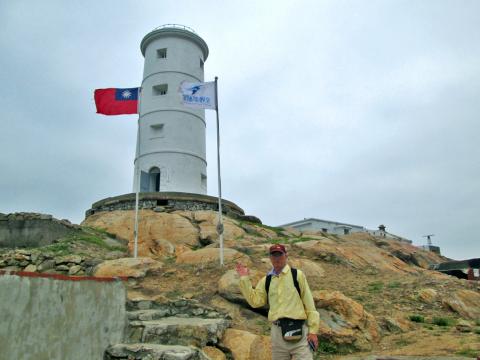Having completed a tour of six lighthouses where his late father served as a watchman, a man from Pingtung County said he hopes the new government respects heroes such as his father who quietly contributed to the nation by fulfilling their duties.
Nien Chi-cheng (念吉成) on Thursday last week visited Beiding Island (北椗島) Lighthouse to honor his father, who once served on the remote atoll in the Kinmen archipelago.
Nien said his father, Nien Hsing-pei (念興培) — a lighthouse watchman his whole life — passed away 30 years ago.

Photo: Tsai Tsung-hsien, Taipei Times
Nien Chi-cheng decided in 2011 to tour the lighthouses his father had worked in.
“Due to its remote location, Beiding Island Lighthouse was the last of the group I visited,” he said.
Maritime and Port Bureau Director-General Chi Wen-jong (祁文中) and Lighthouse Superintendent Chen Chien-kuo (陳建國) helped him with the travel arrangements, Nien Chi-cheng said, adding that it was important to him that he finished the tour the day before President Tsai Ing-wen’s (蔡英文) inauguration on Friday.
“Tsai once said that ‘it is the collective striving of the people that makes this nation great,’” Nien Chi-cheng said. “With this in mind, I hope the government respects and restores our history, so that the nameless heroes who have quietly contributed to the nation by manning their posts might not be forgotten.”
According to the bureau, Beiding Island is 0.08 km2 in size, and has no electricity or running water; its small group of lighthouse personnel, rotated every 15 days, are supplied with auto batteries, desalinated seawater and rations by sea.
Because transit to the atoll is dependent on the tides, Nien Chi-cheng arrived at the atoll by boat at 10am and had to depart within the hour.
He was tearful during the voyage, saying: “Visiting the island today helped me understand how lonely it was to be a lighthouse watchman on Beiding Island.”
Nien Chi-cheng said his father was transferred in 1945 from Niushandao Lighthouse in China’s Fujian Province to Beiding Island, and in the following year was transferred to a lighthouse in Penghu.
Nien Chi-cheng said that after his father was stationed on Beiding, he had no further contact with his family in Fujian.
Nien Chi-cheng said he plans to write a book about the history of Taiwan’s lighthouse watchmen.
The Beiding Lighthouse was built in 1882 and its original uppermost structure was destroyed by US bombers during World War II, the bureau said.
In 1996, when Chinese launched missiles into the Taiwan Strait, the lighthouse staff were ordered to “live and perish with the lighthouse” and to write their wills, the bureau said.

A preclearance service to facilitate entry for people traveling to select airports in Japan would be available from Thursday next week to Feb. 25 at Taiwan Taoyuan International Airport, Taoyuan International Airport Corp (TIAC) said on Tuesday. The service was first made available to Taiwanese travelers throughout the winter vacation of 2024 and during the Lunar New Year holiday. In addition to flights to the Japanese cities of Hakodate, Asahikawa, Akita, Sendai, Niigata, Okayama, Takamatsu, Kumamoto and Kagoshima, the service would be available to travelers to Kobe and Oita. The service can be accessed by passengers of 15 flight routes operated by

GIVE AND TAKE: Blood demand continues to rise each year, while fewer young donors are available due to the nation’s falling birthrate, a doctor said Blood donors can redeem points earned from donations to obtain limited edition Formosan black bear travel mugs, the Kaohsiung Blood Center said yesterday, as it announced a goal of stocking 20,000 units of blood prior to the Lunar New Year. The last month of the lunar year is National Blood Donation Month, when local centers seek to stockpile blood for use during the Lunar New Year holiday. The blood demand in southern Taiwan — including Tainan and Kaohsiung, as well as Chiayi, Pingtung, Penghu and Taitung counties — is about 2,000 units per day, the center said. The donation campaign aims to boost

MORE FALL: An investigation into one of Xi’s key cronies, part of a broader ‘anti-corruption’ drive, indicates that he might have a deep distrust in the military, an expert said China’s latest military purge underscores systemic risks in its shift from collective leadership to sole rule under Chinese President Xi Jinping (習近平), and could disrupt its chain of command and military capabilities, a national security official said yesterday. If decisionmaking within the Chinese Communist Party has become “irrational” under one-man rule, the Taiwan Strait and the regional situation must be approached with extreme caution, given unforeseen risks, they added. The anonymous official made the remarks as China’s Central Military Commission Vice Chairman Zhang Youxia (張又俠) and Joint Staff Department Chief of Staff Liu Zhenli (劉振立) were reportedly being investigated for suspected “serious

ENHANCING EFFICIENCY: The apron can accommodate 16 airplanes overnight at Taoyuan airport while work on the third runway continues, the transport minister said A new temporary overnight parking apron at Taiwan Taoyuan International Airport is to start operating on Friday next week to boost operational efficiency while the third runway is being constructed, the Ministry of Transportation and Communications said yesterday. The apron — one of the crucial projects in the construction of the third runway — can accommodate 16 aircraft overnight at the nation’s largest international airport, Minister of Transportation and Communications Chen Shih-kai (陳世凱) told reporters while inspecting the new facility yesterday morning. Aside from providing the airport operator with greater flexibility in aircraft parking during the third runway construction,